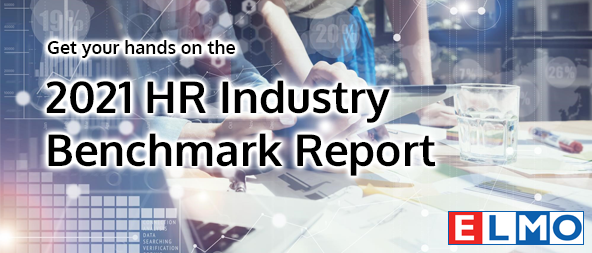Do you know how long it takes to fill a vacant role in your organisation, and what the hiring process costs?* This report has all the important answers.
Do you know what your people-related challenges are for the next 12 months – and how these will be overcome? What skills will you need to ensure your organisation shifts from ‘survive’ to ‘thrive’? The answers to these questions and many more can be found in ELMO Software’s 2021 HR Industry Benchmark Report.
In September 2020, ELMO partnered with the Australian Human Resources Institute (AHRI) to survey the HR profession about its challenges and current practices across every element of talent management – from hire to retire. The survey drew responses from over 1800 HR professionals in Australia and New Zealand. Data in the report is split by company size, geography (Australia/New Zealand), role seniority, and industry – enabling you to benchmark your current HR practices against your peers.
New challenges and priorities for uncertain times
Given the turmoil of 2020 and the fundamental changes to workplace practices and the employee experience (EX), respondents were asked about their anticipated challenges over the next 12 months. The results provide perhaps the most critical take-aways from the report.
Interestingly, two learning and development challenges took out the top two most anticipated challenges. Firstly, ‘upskilling, cross-skilling or re-skilling employees’ was cited by 26 per cent of respondents. Courses relating to technical skills/certifications were the most popular, followed by courses relating to workplace health and safety. As employers recover from the pandemic, they will rely more than ever before on the skills and expertise of their employees to navigate the road ahead. We’ve seen how technology is forcing employees to keep their skills sharp, but let’s not forget the so-called ‘soft skills’ such as negotiation, problem-solving and collaboration.
‘Leadership development’ was also cited by 26 per cent of respondents. Leaders have to deal with a VUCA world – that is, a world that is volatile, uncertain, complex, and ambiguous, so they need to be agile and adaptable. They also need to be able to deal with constant change, a deluge of data and evolving regulations and compliance issues. Building the skills to deal with this VUCA world will be vital, whether it’s done via coaching or mentoring, job rotations or formal courses.
A new challenge, cited by 23 per cent of respondents, is dealing with the dramatic increase in remote working. This is something all organisations have had to adjust to. Employee expectations around where and when work is undertaken has fundamentally shifted from the traditional 9 to 5, Monday to Friday – and this looks set to continue as hybrid workplaces become commonplace. Flexible work options will now be engrained into the EX. Those organisations that cannot or will not offer flexibility will suffer.
Just as critically, the pandemic forced many leaders to reconsider how important employee wellness is to sustainable business operations. This was the fourth most significant challenge, cited by 17 per cent of respondents. In 2021 this focus will continue – but it will be a holistic approach to wellbeing, encompassing mental, physical, financial and social wellbeing.
What does this mean for HR professionals?
The profession finds itself in a more respected position now than it ever has, simply due to everything HR had to deal with during the pandemic – from functional, day-to-day operations to contributing to strategic decisions (downsizing, change management, etc). To maintain this heightened status, HR professionals must continue to upskill themselves. According to the survey results, top of the list of desired skills for HR to develop in 2021 are ‘strategic planning’ and ‘HR reporting and analytics’. The latter was even more critical during 2020, as so many difficult, quick decisions had to be made. It’s no longer good enough to rely on ‘gut instinct’. HR will be expected to ‘know the numbers’ and become adept at data-driven decision-making.
The road ahead
All business leaders – and HR in particular – have a challenging time ahead. However, as respected HR critic and observer, Dave Ulrich, put it: “A crisis is a terrible thing to waste”. This year is the perfect time to take stock and understand what this new, uncharted era requires from employers.
For a comprehensive overview of HR and payroll trends, challenges, use of metrics and technology, and much more, download the 2021 HR Industry Benchmark Report today.
*Organisations typically fill vacant roles within an average of 33 days. The average cost to hire a new employee is ~$10,500 and is over twice as much for C-level executives.
ELMO Software offers people, pay and process solutions for the entire employee lifecycle, from ‘hire to retire’. This includes recruitment, learning, performance management, payroll, rostering / time & attendance, business expenses, and more. For further information, contact ELMO.


